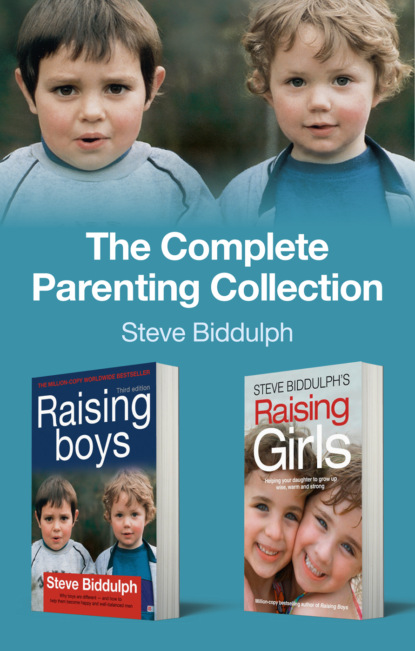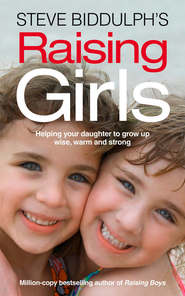По всем вопросам обращайтесь на: info@litportal.ru
(©) 2003-2024.
✖
The Complete Parenting Collection
Автор
Год написания книги
2018
Настройки чтения
Размер шрифта
Высота строк
Поля
You need to have these kinds of friends to provide what uncles and aunts used to – someone who cares about and enjoys your kids. These friends can show an interest in your youngsters, and ask them about their views. Hopefully they will make your kids welcome in their homes, ‘kick their bum’ occasionally, and be a listening ear when things at home are a little tense. (Many a mother has experienced a big fight with her teenage daughter, who then runs off to tell her woes to her mum’s best friend down the road. This is what friends are for!)
You can do the same for their kids, too. Teenagers are quite enjoyable when they are not your own!
PRACTICAL HELP
OVERCOMING BOYS’ TENDENCY TO ARROGANCE
It’s possible that boys are naturally prone to a certain degree of arrogance. Until recently, boys were often raised expecting to be waited on by women. In some cultures, boys are still treated like little gods. In today’s world, the result can be an obnoxious boy that no-one wants to be around.
It’s therefore very important that boys are taught humility – through experiences such as having to apologise, having to do work to help others, and always having to be respectful to others. Kids have to know their place in the world, or the world will most likely teach them a harsh lesson.
Whenever you are treated badly by youngsters – jostled in the street by a skateboarder, treated rudely by a young salesperson, or have your house burgled – you are dealing with youngsters who have not been helped to fit in and be useful.
Teenagers are naturally prone to be somewhat self-absorbed, to fit their morality to their own self-interest, and to be thoughtless of others. Our job as parents is to engage them in vigorous discussions about their obligations to others, fairness, and plain right and wrong. We must reinforce some basics – ‘Be responsible. Think things through. Consider others. Think of consequences’. Just loving your kids isn’t enough, some toughness is necessary. Mothers begin this, fathers reinforce it, and elders add their weight if it still hasn’t sunk in.
One good strategy is to have boys involved in service to others – the elderly, disabled people, or young children whom they help or teach. They learn the satisfaction of service, and they grow in self-worth at the same time.
What if there is no mentor available?
If there are no mentors around, then a young man will fall into a lot of potholes on the road to adulthood. He may fight needlessly with his parents in trying to establish himself as independent. He may just become withdrawn and depressed. Kids at this age have so many dilemmas and decisions – about sexuality, career choices, what to do about drugs and alcohol … If Mum and Dad keep spending time with him, and are in touch with his world, then he will keep talking to them about these things. But sometimes there will be a need to talk to other adults, too. In one study, it was shown that just one good adult friend outside the family was a significant preventative of juvenile crime (as long as the friend isn’t into crime!).
Young men will try their best to find structure and direction in their lives. They may choose born-again religion or an Eastern cult, disappear into the Internet, follow Emo or Goth music and fashion, play sport, join a gang or go surfing. These pursuits may be helpful or harmful. If we don’t have a community for kids to belong to, they will make their own. But a community made up only of the peer group is not enough – it may be just a group of lost souls, without the skills or knowledge to help each other. Many boys’ friendship circles are really just loose collections that offer very little sharing or emotional support.
The worst thing we can do with adolescents is leave them alone. This is why we need those really great schoolteachers, sport coaches, scout leaders, youth workers and many other sources of adult involvement at this age. We need enough so that there is someone special for every kid – a tall order.
Today we mostly get mothering right, and fathering is undergoing a great resurgence. Finding good mentors for the kids in our community is the next big hurdle.
IN A NUTSHELL
In the years between birth and six, boys need lots of affection so they can ‘learn to love’. Talking and teaching one-to-one helps them connect to the world. The mother is usually the best person to provide this, although a father can take this part.
At about the age of six, boys show a strong interest in maleness, and the father becomes the primary parent. His interest and time become critical. The mother’s part remains important, however: she shouldn’t ‘back off’ from her son just because he is older.
From about fourteen years of age, boys need mentors – other adults who care about them personally and who help them move gradually into the larger world. Old societies provided initiation to mark this stage, and mentors were much more available.
Single mothers can raise boys well, but must search carefully for good, safe, male role models and must devote some time to self-care (since they are doing the work of two).
Special announcement: gender differences are real!
Our ideas about gender differences have changed dramatically over the years. For many centuries, biological difference was used as a reason to keep women’s lives in narrow roles. The waste of talent and the frustration of life chances was horrendous: women were not allowed to vote, get equal pay, own property, and so on. They were not supposed to join the paid workforce, or if they did, it was as a nurse, never a doctor; a secretary, never a boss. Turning this on its head – affirming that women could do anything men could – was one of the most important social movements of the twentieth century.
Then, for about thirty years – from the 1960s to early 1990s – it was thought that boys and girls had no differences other than those we ‘created’ through conditioning – the clothes and toys we give them, and how we treat them. Well-meaning parents and lots of preschools and schools got quite fanatical about this, working hard to get the boys to play with dolls and the girls into the Lego. It was felt that if we raised all children the same, then gender differences and problems would disappear. But gradually the evidence mounted that there were important and immutable differences that were simply wired in. (Some were blindingly obvious: for instance, in all cultures girls enter puberty two years before boys do, which causes much havoc in the world of schoolyard romance.)
With the advent of brain-scanning technology, this argument was pretty much settled. Today we are focussed on understanding the differences and making sure they aren’t a problem. If a girl’s brain develops more quickly than a boy’s, we can plan accordingly so this can be managed in schools and homes. If a boy has an inbuilt need to be active and use his body a lot, we can work out ways for this to happen that don’t mean he is ‘bad’. We can be sure to read to boys so that they become more verbal and better able to talk to girls! We can have less blame and more understanding.
In the next two chapters we will look at two major differences that are very significant in learning to help our sons grow up well:
1. how hormones (such as testosterone) influence boys’ behaviour, and what to do about it, and
2. how boys’ and girls’ brains grow differently and affect their ways of behaving and thinking.
PRACTICAL HELP
KNOWING THE DIFFERENCES
Some of the real gender differences are so obvious that it’s amazing they were overlooked. For example, the average boy has 30 percent more muscle bulk than the average girl. Boys are stronger and their bodies are more inclined to action. They even have far more red blood cells (the original red-blooded boy!). It has nothing to do with gender conditioning. We have to give boys plenty of chance to exercise – girls too if they want it. Boys will need extra help to control themselves from hitting both each other and girls. Girls need help to learn not to use their better verbal skills to needle and demean boys. And so on.
This doesn’t mean saying, ‘Every boy must …’ or ‘Every girl must …’. After all, some girls are stronger and more physical than many boys. (Some girls need training in nonviolence. In one Sydney school, some parents removed their sons because the girls kept hitting them.) Gender differences are generalisations that are true enough of the time to be very helpful.
PRACTICAL HELP
BOYS AND HEARING
Colin is ten. He is in trouble at school because he doesn’t pay attention. He gets bored, starts to mess around, and gets sent to the principal’s office. Is he stupid? Bad? Does he have ADHD or ODD (Oppositional Defiant Disorder) or OCD (Obsessive-Compulsive Disorder) or any of the other Ds? Perhaps, but there’s another possibility. What if he just can’t hear? What if his teacher’s voice is just too soft and he gets bored with its faintness, and at home he misses half of what is being said to him? Many parents joke that their son seems deaf when told to clean up his room. And school nurses have long noted that boys get blocked ears more frequently than girls. But there may be more serious factors at play.
Psychologist Leonard Sax, in his book, Why Gender Matters, makes some amazing claims about boys’ hearing. He presents research to show that boys do not hear as well as girls, and argues that boys need teachers who speak louder. He cites Janel Caine, a postgraduate student in Florida, who studied the effects of music on premature babies. These babies lie in their incubators all day, and Caine felt that perhaps some gentle music might help their growth and development. And boy, was she was right! In her astonishing findings, girl babies receiving music ‘therapy’ were discharged from the hospital on average nine days sooner than those who didn’t have the music. It really perked them up! But here’s the thing: boy babies did not show any such benefit. They either didn’t hear the music, or it didn’t affect them.
It’s actually hard to know what tiny babies hear – we can’t just ask them, ‘Did you hear that?’ But lately, some methods have been discovered that can tell if the brain is receiving the message that goes into the ears. Dr Sax claims that, in studies of ‘acoustic brain response’, girl babies have an 80 percent greater brain response to sounds than baby boys do. And guess what frequency this is in? The frequency of speech.
The difference continues into adolescence and adulthood. This might explain that terrible syndrome – complained about by teenage girls worldwide – that Dad is always yelling at them, when Dad thinks he is using a gentle voice!
In a number of recent commentaries, however, Dr Sax has been accused of exaggerating or misrepresenting the research – making sweeping claims from fairly obscure studies. And it does stand to reason that if a huge gender hearing difference was the norm, audiologists would have told us about it earlier.
Nonetheless, there is no harm in being more hearing-aware around boys. And dads, if your daughters wince when you talk to them, maybe talk a little softer.
It’s also possible that the problem of boys in school is not so much to do with hearing as with understanding. Australian audiologists Jan Pollard and Dr Kathy Rowe found that about a quarter of children aged six have poor auditory processing (separating what they hear into meaningful words). And most of these children (70 percent) turn out to be boys. These children have trouble understanding a sentence if it has more than eight words in it! Because teachers often use much longer sentences when teaching, these kids are stuck trying to understand the first part while the teacher (or parent) is going full-steam ahead with the rest of the message. The researchers recommend that teachers use short sentences, and only go on speaking when they see that ‘lights-on’ effect in children’s eyes. And Dr Sax adds that perhaps boys should sit at the front of the class, not the back.
Chapter 3 Testosterone! (#ulink_7884b49a-48a3-5d14-97ca-06820b3ef0d2)
Janine is pregnant – seven weeks pregnant – and very excited. She doesn’t know it yet, but her baby is going to be a boy. We say ‘going to be’ because a foetus doesn’t start that way. It may surprise you to know that all young creatures start life being female. Boys are mutated girls! The Y chromosome that makes a baby into a boy is an ‘add-on’ chromosome which starts to act in the womb – to give a boy the extra bits he needs to be a boy and to stop other bits growing. A male is a female with optional extras. That’s why everyone has nipples, though not everyone needs them.
The testosterone cycle
In Janine’s baby’s tiny body, at around the eighth week of pregnancy, the Y chromosomes stir in the cells and testosterone starts being made. As a result of this new chemical presence, the baby starts to become more of a boy, growing testicles and a penis, and making other more subtle changes in his brain and body. Once the testicles are formed (by the fifteenth week they are fully developed), they start to make testosterone, too, so he becomes progressively more and more masculine.
If Janine is very stressed, her body may suppress the testosterone in baby Jamie’s body, and he may not fully develop his penis and testicles, so he will be incompletely developed at birth. He will catch up, however, in the first year.
Right after birth, young Jamie will have as much testosterone in his bloodstream as a twelve-year-old boy! He has needed all this testosterone to stimulate his body to develop male qualities in time to be born. This ‘testosterone hangover’ will result in him having little erections from time to time as a newborn.
By three months of age, the testosterone level will drop off to about a fifth of the birth level, and throughout toddlerhood the level will stay pretty low. Boy and girl toddlers (I’m sure you’d agree) behave pretty much the same.
At the age of four, for reasons nobody quite understands, boys receive a sudden surge of testosterone, doubling their previous levels. At this age, little Jamie may become much more interested in action, heroics, adventures and vigorous play. His dad may well find that this age is a good one because Jamie can now play ball games, and they can do gardening together: they can interact in ways that were not possible when he was little and helpless.
At five years of age, the testosterone level drops by a half, and young Jamie calms down again, just in time for school! Enough testosterone is still around for him to be interested in activity, adventure and exploration, but not especially interested in girls.
Somewhere between the ages of eleven and thirteen, the level start to rise sharply again. Eventually – usually around fourteen – it will increase by some 800 percent over the level of toddlerhood. The result is a sudden growth and elongation of his arms and legs – so much so that his whole nervous system has to rewire itself. In about 50 percent of boys, the testosterone levels are so high that some of it converts into estrogen, and breast swelling and tenderness may be experienced. This is nothing to worry about.
Brains go out the window











